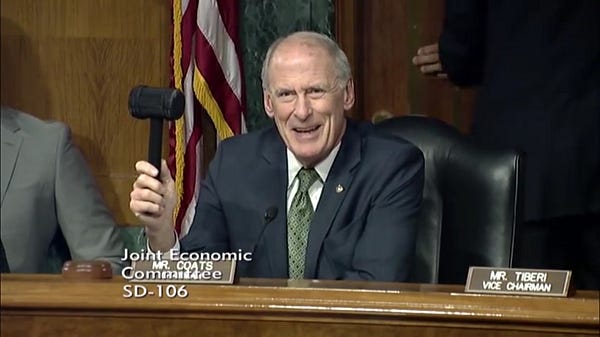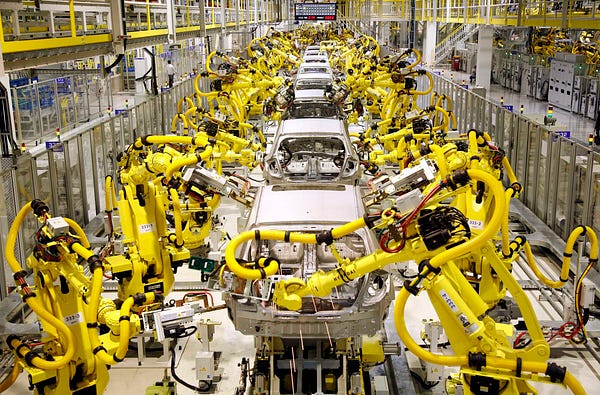Basic Income discussed among US Senators at “The Transformative Impact of Robots and Automation” Hearing
Universal Basic Income was recently discussed among US Senators and Congress members of the Joint Economic Committee (JEC) during a hearing on “The Transformative Impact of Robots and Automation” May 25, 2016.

Senator Dan Coates (R-IN) began the hearing with a hit from a large gavel 3D printed at a local DC library. He then shared a photograph of a modern assembly line, commenting:
I’m used to seeing that line filled with dozens of human being assembling parts…Now all I see is a number of robots doing that same process…precise robots that can weld and assemble vehicles far more advanced than ever before.

Each of the reps shared similar concern and questions about our ever more increasingly automated future.
Rep. Carolyn Maloney (D-NY): One study finds that nearly half of us jobs are at risk of being lost to Automation in the next couple of decades…What should we do as policymakers to both advance innovation and the expected productivity benefits on the one hand, while also supporting workers adversely affected by technological changes on the other hand? And how can we harness this engine of prosperity while making sure that benefits are widely shared?
Senator Bob Casey (D-PA): There’s a neighborhood in Pittsburgh still known as the Strip District. But now it is known also by the phrase “Robotics Row”…No matter what chart you use or how you track it, there has been a disconnect between the wages and productivity…How do we ensure that workers get their fair share of the benefits of these technological breakthroughs?
Senator Mike Lee (R-UT): What we think of as high skilled jobs today could easily be tomorrow’s low skilled jobs. In much the same way that high skilled welders of yesterday…have been replaced…software developers today could find that in many instances their jobs have been replaced through automation. What do you think happens when that occurs?…When we develop technology that does our coding for us?
Senator Dan Coates (R-IN): Is our social safety net prepared for a 21st century labor market?

For guidance, the representatives looked to a panel of 3 expert witnesses: Dr. Andrew McAfee (MIT), Dr. Harry Holzer (Georgetown University), and Adam Kieper (Ethics & Public Policy Center). Each panelist agreed automation technology, along with globalization, has resulted in lower wages. As Dr. Holzer put it, “The owners of the capital embodying the new technology, profit at the expense of workers overall.”
Dr. Holzer went on to argue that fears of automation eliminating millions of jobs have historically been overblown. And he’s right. In fact there was a Senate hearing 1955 on the subject of “Automation and technological change” and the worries did prove to be overblown. Factory jobs turned into service jobs. And while some jobs were eliminated, new jobs, like computer programmer, were created.
Dr. McAfee however, insisted that although we have to be careful with our predictions as nothing is know for sure, “There is in fact something different now.” McAfee pointed to charts illustrating the trend of increased production with decreasing employment. “The American workforce is very clearly going through some very major changes”.
McAfee also noted and that “If a piece of technology is not already the world’s best medical diagnostician, I think it will be very quickly” (likely referring to IBM’s supercomputer Watson that defeated the best humanity had to offer at Jeopardy). McAfee ended his opening testimony stressing that, “We ain’t seen nothing yet.”
Both the reps and panelists agreed improvements in education will be necessary to combat “worker displacement” (unemployment) due to automation. Teaching students skills that are better suited for an automated future and retraining the unemployed. (But it is difficult to believe we can simply send the 3.5 million professional truck drivers in the United States back to school when self-driving cars hit the road. Especially when there are already not enough jobs for everybody as is.)
The third panelist, Adam Kieper, offered another solution: Basic Income.
Adam Kieper: Some people have begun to talk about a universal income guarantee — basic income is a potential policy solution to a future in which nobody has to work in some distant future because productivity is so high all of our basic needs are taken care of and fewer and fewer people need jobs.
I think it’s very likely that we’ll hear people from both the left and the right really start to discuss and analyze and debate guaranteed income in the years ahead.
The discussion didn’t take years to come. The discussion continued right then and there as Rep. Don Beyer, a Democrat from Virginia, chimed in.
Rep. Don Beyer (D-VA): Mr. Keiper, you wrote about Universal Basic income and negative income tax — -you know, what do you do when actually a significant part of the population doesn’t need to be employed. And you wrote also, you said that it has been discussed favorably for various reasons by prominent conservative and libertarian thinkers. Can you expand why they would be for that? I understand the left leaning Progressive but…
Mr. Kieper: [Guaranteed basic income] is something that Hayek talked about, something that Milton Friedman spoke about favorably, something that Charles Murray has written about favorably…Folks on the Libertarian side of the spectrum see it as a couple things. One it’s a way to it continue to encourage innovation. And two…Freedman’s approach, it would be less complicated than continuing the bureaucratic system of welfare…He thought that if you replaced it with something simple and clean and seamless that would be an improvement…It’s interesting and surprising how you get people on the left and the right talking about this with interest — very little interest in the moderate middle, though I think that’s likely to change in the years ahead.
What did the other panelists think of Basic Income?
Although “not anxious to go there anytime soon”, Dr. Holzer agreed “I understand that this could be necessary down the road.” Dr. McAfee didn’t speak specifically on basic income during the hearing but in a past TED talkhe did, he concluded that, “If we are moving into an economy that’s heavy on technology and light on labor — and we are, then we have to consider some more radical interventions, for example, something more radical like a guaranteed minimum income.”
Senator Michael Lee gave the closing remarks:
Sen. Lee (R-UT): The value of this technology to the world economy and to our domestic economy is of course enormous. The impact of this technology will go far beyond the bottom lines of businesses though. It is, and it will continue, to have an impact on the nature of work, and by extension, the ways in which we live and define our lives. But it will also impact on society more broadly, and our social safety net, as some individuals see their jobs becoming automated. Even, and especially those who don’t ever see their jobs as the type that could become automated. You ask most people if they are likely to be replaced by robots, most people are probably going to say “No”. A much higher percentage of them are actually likely to see their jobs replaced, perhaps within their lifetimes.
The American people have been resilient, and they’ve been more than patient. But they’re competing in the 21st century economy, while relying on a fraying 20th century safety net. We need a safety net policy, or a set of policies, that are as flexible, and nimble, and diverse, and as adaptable to technological change as our society and economy are becoming. And this is something that’s going to need the insights of both parties to get it right. And not jut both parties but also the insights of the brightest minds in our country.
The meeting was adjourned with a blue gavel, 3D printed at a local public school.
PLEASE SUPPORT ME ON PATREON: https://www.patreon.com/Orf
This resource was compiled thanks to a crowdfunded monthly basic income. If you find value in this article, you can support it along with all my future work with a monthly patron pledge of $1+.
Special thanks to: Aaron Brodeur,Amanda Amarotico, Andrea, Arjun Banker, Arthur Egendorf, betastarchild,Beth Nawrocki, Bob Bogardus, Brandy, Chris Brosz, Christina Vircillo,Christine Collie Rowland, David Ryal ‘Pug’ Anderson, Dreama, Eleanor Kuser, George Kao, James, Jeff Oplinger, Jenna Wikler, Johnny Proctor,Laura Ballard, Liane Gale, Liz Arriaza, Margaret Lion, Mary Burke, Mary Kay Benson, Michael Scott, Michelle A OHara, Monica, Nancy Clifford, Pedro Alexandre Moreira, Sandeep Mangla, Scott Santens, Sebastian, sherrie Parks, T Cutler, Tanu Kaskinen,Waldir Pimenta, & Zak Groner